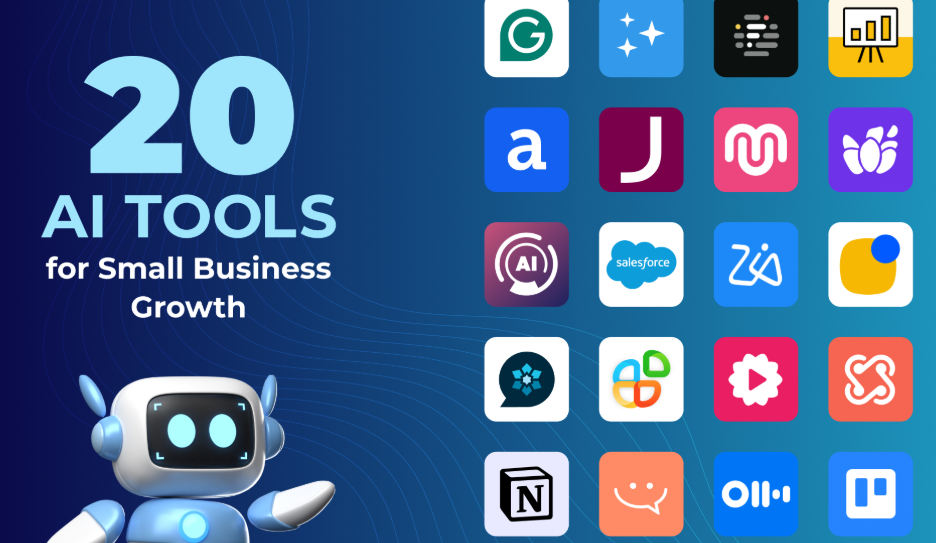Introduction to AI and its Impact on Business
In today’s fast-paced business landscape, staying ahead of the competition is more important than ever. Enter artificial intelligence (AI)—the game-changing technology that is transforming how companies operate. From automating mundane tasks to providing data-driven insights, AI tools for business are reshaping strategies and boosting profitability like never before.
Imagine having a virtual assistant that learns from your preferences or predictive analytics that help anticipate customer needs. With AI at your fingertips, businesses can streamline operations while enhancing customer experiences. The possibilities are endless!
As we delve deeper into this digital revolution, it’s crucial to explore the essential AI tools available and understand their impact on efficiency and growth within organizations. Let’s embark on this journey through the fascinating world of AI in business together!
The Top AI Tools for Businesses
When considering AI tools for business, several standout options cater to diverse needs.
First up is Salesforce Einstein. This tool enhances customer relationship management by delivering predictive insights that help businesses understand their clients better.
Next, there’s HubSpot, which integrates AI into marketing automation. It streamlines lead generation and provides personalized content recommendations.
For data analysis, Tableau stands out with its powerful visualization capabilities. It transforms complex data sets into clear visuals that drive informed decision-making.
Additionally, chatbots like Drift enhance customer service efficiency by engaging users in real time and providing instant responses to common queries.
Platforms like Zapier allow seamless integration of various apps using AI-driven workflows. This eliminates repetitive tasks and boosts productivity across teams.
These tools empower businesses to leverage technology effectively while focusing on growth strategies that matter most.
How AI Can Improve Efficiency in Various Aspects of Business
AI reshapes efficiency across different business functions. In customer service, chatbots handle inquiries round the clock, freeing human agents for complex issues. This ensures faster response times and improved satisfaction.
In marketing, AI analyzes data to refine targeting strategies. Businesses can reach their ideal customers with precision, maximizing ROI on ad spend.
Supply chain management benefits too. Predictive analytics help forecast demand accurately. This leads to better inventory management and reduced waste.
Human resources see enhancements as well. AI streamlines recruitment processes by filtering resumes quickly based on specific criteria.
Finance departments utilize AI for risk assessment and fraud detection. Algorithms analyze transactions in real-time, identifying anomalies that require attention.
By integrating these tools into daily operations, businesses not only save time but also optimize resource allocation effectively for sustainable growth.
Case Studies: Companies that Have Successfully Implemented AI Tools
Numerous companies have harnessed the power of AI tools to enhance their operations and drive growth. For instance, Netflix employs advanced algorithms for personalized content recommendations. This not only boosts user engagement but also reduces churn rates.
In retail, Walmart uses AI analytics to optimize inventory management. By predicting demand patterns, they ensure shelves are stocked appropriately while minimizing waste.
Another noteworthy example is Tesla’s use of AI in autonomous driving technology. This ambitious project has transformed how consumers view transportation and safety on the roads.
Even small businesses are getting in on the action. A local coffee shop used chatbot technology to streamline customer orders online, resulting in faster service and happier patrons.
These diverse cases highlight that regardless of size or industry, implementing AI tools can lead to significant advancements and competitive advantages.
Addressing Concerns and Challenges with AI Implementation
Implementing AI tools for business comes with its share of concerns. One major issue is the fear of job displacement. Employees often worry that automation might replace their roles, leading to uncertainty in the workplace.
Another challenge lies in data privacy and security. Businesses must ensure that sensitive information is protected while using AI solutions. This requires robust cybersecurity measures and clear policies.
Integration complexity can also be daunting. Introducing AI tools into existing systems demands careful planning and resources, which some companies may lack.
There’s a knowledge gap in understanding how to fully leverage these technologies. Investing in training programs can help bridge this divide, enabling teams to use AI effectively without hesitation or confusion.
Addressing these challenges proactively fosters an environment where businesses can embrace innovation confidently and responsibly.
The Cost of Implementing AI vs Potential Long-Term Benefits
Investing in AI tools for business can seem daunting. Initial costs may include software, hardware, and training staff. These expenses can be a barrier for many companies.
However, the long-term benefits often outweigh these upfront investments. Increased efficiency leads to cost savings over time. Automation reduces manual labor and minimizes human error.
Consider how AI enhances decision-making with data-driven insights. Businesses can pivot quickly based on real-time analytics, leading to better strategies and higher revenue potential.
Moreover, customer experience improves significantly with AI solutions like chatbots and personalized marketing campaigns. Satisfied customers are likely to return and recommend your services.
While the path to integration might involve challenges, the rewards of adopting AI tools create a strong case for businesses aiming for growth in a competitive landscape. Embracing this technology fosters innovation that keeps you ahead of industry trends.
Conclusion: The Importance of Embracing AI for Sustainable Growth in Business
The integration of AI tools for business is no longer just an option; it has become a necessity. Companies that embrace these technologies are better equipped to adapt to market changes and consumer demands. By leveraging AI, businesses can streamline their operations, enhance customer experiences, and make data-driven decisions.
The path to adopting AI may have its hurdles. However, the benefits far outweigh the challenges when approached strategically. The potential for increased profitability and efficiency positions companies at the forefront of innovation in their industries.
As we move forward into a more digital age, those who harness the power of AI will not only survive but thrive. Embracing these tools is key to unlocking sustainable growth and ensuring long-term success in today’s fast-paced business landscape.

